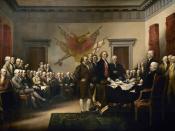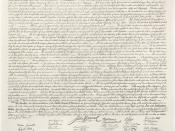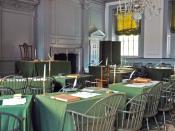Are We There Yet?
Independence Shawl: The Unveiling Of A Hidden Paradox
Based on Independence Hall in American Memory (University of Pennsylvania Press, 2002) by Charlene Mires
In 1776, the Continental Congress adopted the Declaration of Independence. In 1787, delegates from the new nation drafted the U.S. Constitution. Both of these events took place within the walls of one of the most significant historic structures in the United States. The building is known as Independence Hall, which is located in the nation's old capitol of Philadelphia, Pennsylvania. Many people do not realize the true significance of the building, for they only remember the two major historic and ground-breaking events previously mentioned. What some tourists and regular citizens alike do not realize is that there is in fact a hidden paradox that lies in the wonder that is Independence Hall. It was not only a place to fight for change to achieve ideal America, but at the same time it also served as a reminder of what and how good it is to be American in order to maintain stability and unity within the nation.
Independence Hall served as a podium for the people "where Americans could celebrate, challenge, and redefine the founding ideals as the nation grew (15)." Between the 1820's and 40's, laborers marched in Independence Square striking for better wages or working conditions, and even rioting at times. "When the union (General Trades Union of the City and County of Philadelphia) engaged in nation's first general strike in 1835, laborers paraded to Independence Square to demand a ten-hour work day. The next year, after leaders of a dock workers' strike were arrested by order of the mayor of Philadelphia, workers gathered in Independence Square--the seat of city government--to demonstrate for the right to set the prices for...


